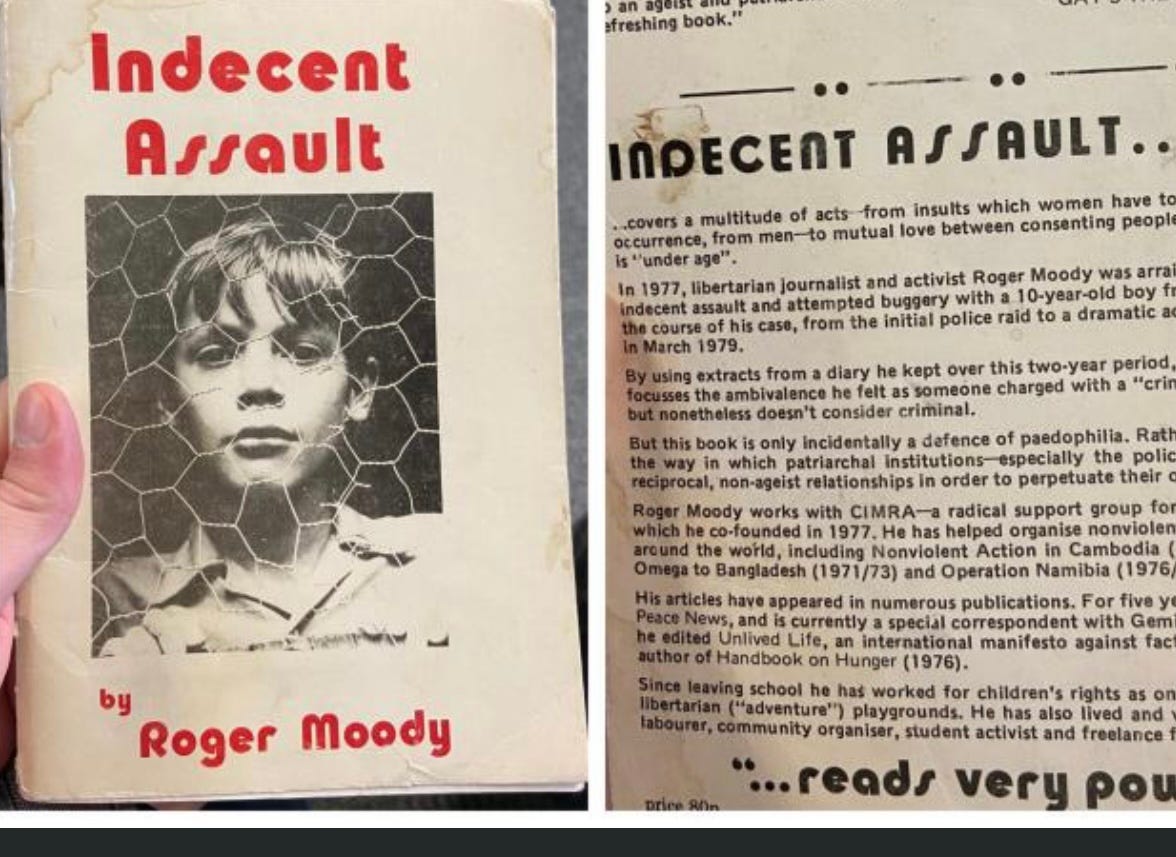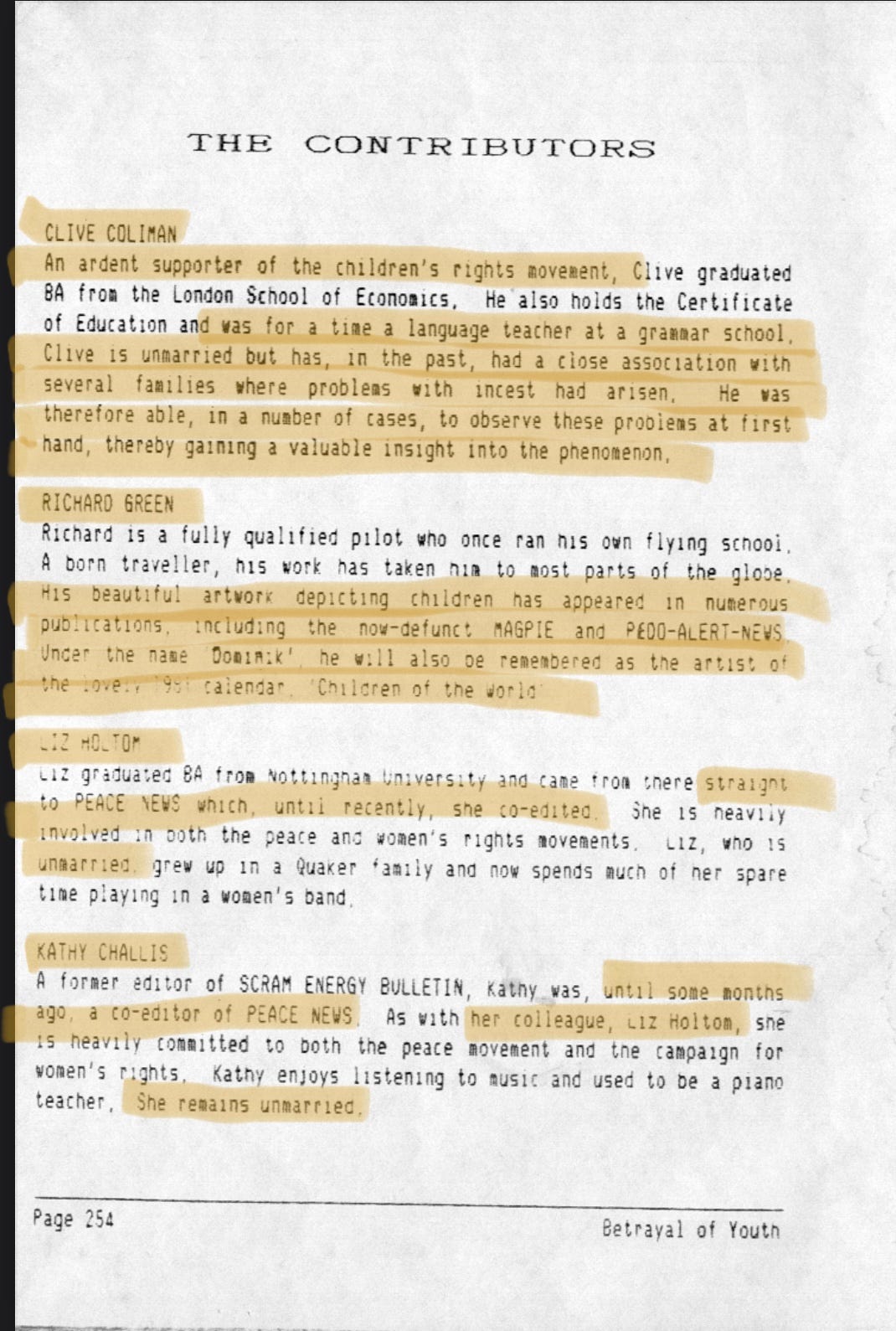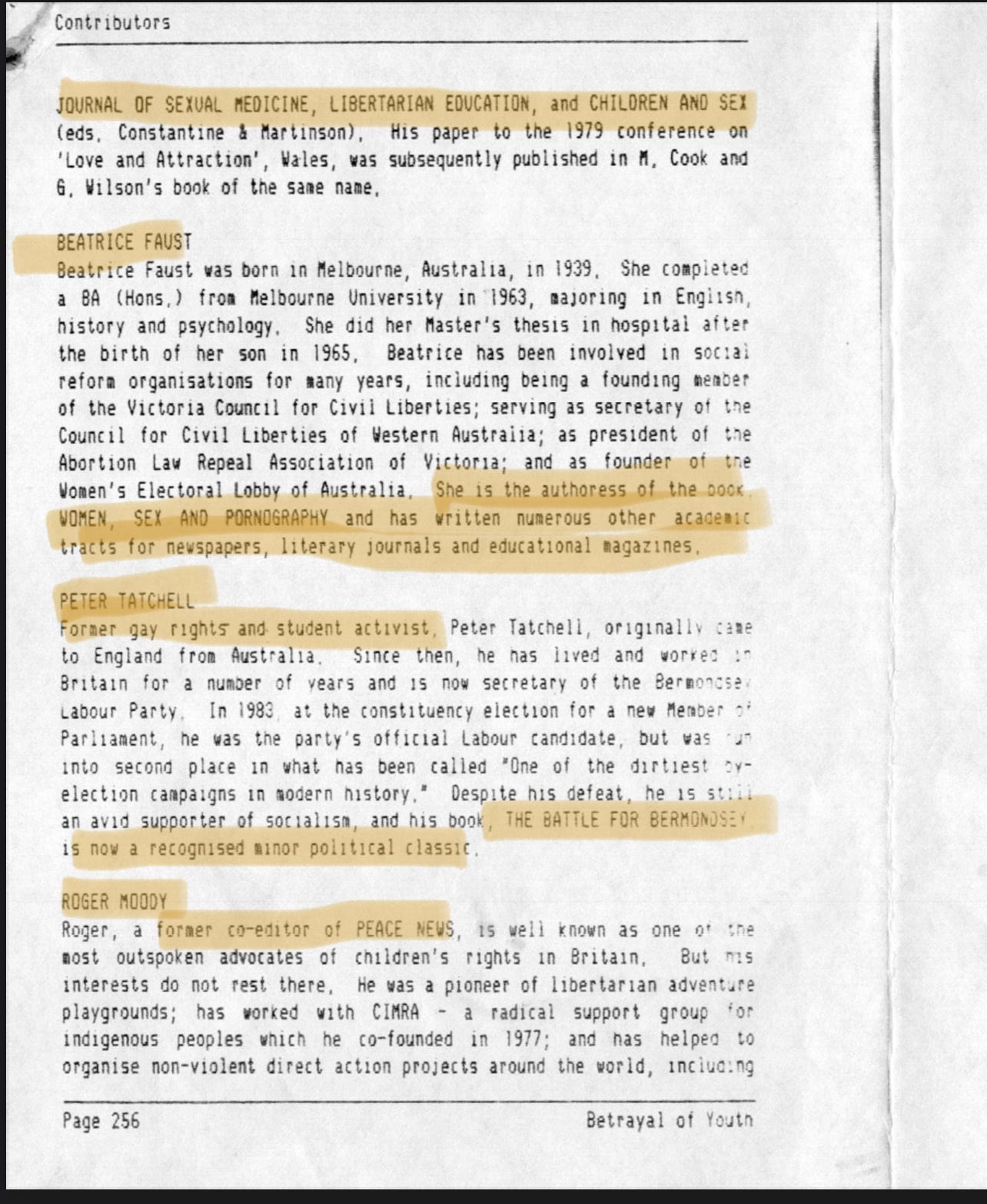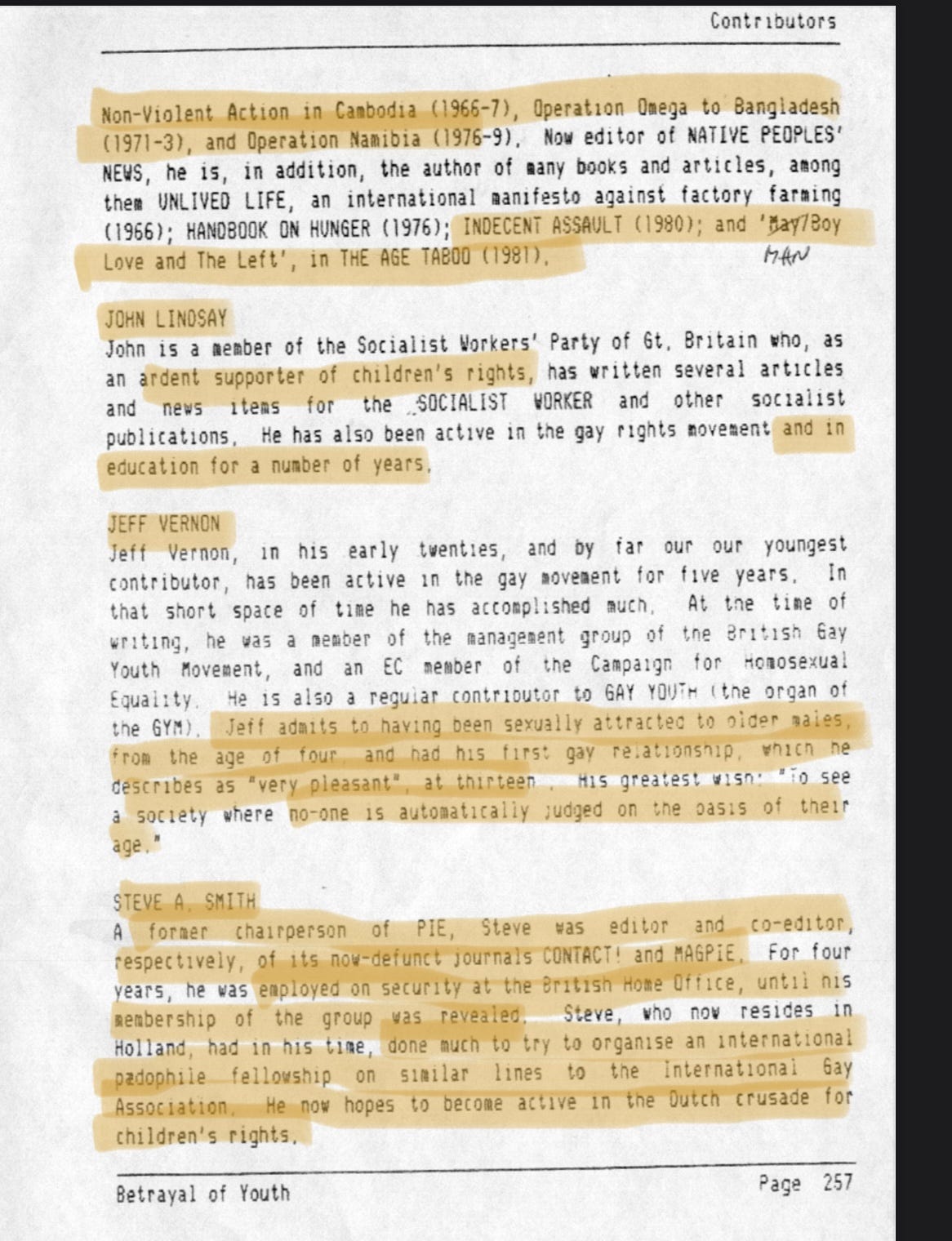Edited by Tim Curtis (@Tpcurtistim)
Now that the introduction and the acknowledgments are out of the way, we can finally start answering one of the questions we asked earlier - namely, who contributed to this collection of essays?
Below, you will find Middleton’s list of contributors, with a brief biographical sketch of each one. Middleton, of course, is not an entirely trustworthy narrator, so where possible/necessary, I have attempted to flesh out this section with details from my own research.
First on the list is Clive Coliman. Described by Middleton as “an ardent supporter of the children’s [sexual] rights movement”, Coliman was at the time of publication a former language teacher who had worked in a grammar school.
One especially bizarre titbit is worth recounting word for word:
“Clive is unmarried but has, in the past, had a close association with several families where problems with incest had arisen. He was therefore able, in a number of cases, to observe these problems at first hand, thereby gaining a valuable insight into the phenomenon.”
Next up is Richard Green, the sexologist and colleague of John Money whom I mentioned earlier. Although it doesn’t come up in online searches, Middleton tells us that Green’s “beautiful artwork depicting children appears in numerous publications”. The two he names are the PIE’s flagship publication The Magpie, and PEDO-ALERT-NEWS. Both were magazines produced by and for paedophiles.
Using the alias “Dominik,” Green also illustrated “the lovely 1981 calendar, Children of the World.” (I was unable to find any photographs of this calendar, or any reference to it online; if anyone does have any information, I would appreciate receiving it.)
Green, the 2006 recipient of the Magnus HirschfeldMedal, is also famous in non-paedophile circles, both for his work on gender identity (he is one of the pioneers of gender ideology) and his December 2002 article in Archives of Sexual Behaviour, entitled “Is Paedophilia a Mental Disorder?”.
Green, unlike the rest of us, seems to have concluded that it is not; he wrote that “a substantial minority of “normal” people experience sexual attraction to children.”
Given his other activities, it is extremely unlikely that this article did not reflect his own predilections.
The next two contributors are Liz Holtom and Kathy Chalis, both former co-editors of Peace News, a still-publishing newsletter that advocates for world peace. The PIE members infiltrated many left-wing organisations during the 1970s, and Peace News seems to have been one of them.
Eric Presland is the next contributor. Described by Middleton as “one of England’s best known and loved gay rights activists”, Presland is indeed a well-known writer and activist.
He was also a supporter of the PIE, and known to be “committed to the liberation of children,” that is, their “right” to be groomed and abused. When the PIE carried a banner in the 1983 London Pride march, Presland “rejoiced in the appearance of the PIE’s banner at the Gay Pride march” in an article for Capital Gay.
Presland also contributed to another publication that promoted paedophilia, Dan Tsang’s The Age Taboo. Writing of one pre-pubescent victim, Presland said, “I fought for him to free himself from the confines of his family.”
I feel it necessary to say here that these are just brief overviews of each contributor. Some, especially Richard Green and Eric Presland, have had long and prolific careers in the public eye. I’ve chosen to focus mostly on their relationships with the PIE and the pro-paedophilia movement.
Tuppy Owens, the next contributor, is most famous as the editor of The Sex Maniac’s Diary, and as a sex therapist who focused on fulfilling sex lives for the disabled. Her Diary mentions both the PIE and paedophilia in a positive light.
In 1983, during a phone-in debate on paedophilia, Owens “calmly reminded listeners…that children, including girls, have sexual feelings too, and suggested that adults can figure positively in their erotic lives”. Her contribution to Betrayal of Youth, a chapter called “Love and Let Love,” consists of an interview she gave to Tom O’Carrol, former head of the PIE and a convicted sex offender, who is our next contributor. His bona fides have already been explored, as Middleton mentioned him in the Acknowledgements.
Father Michael Ingram is next on the list. Ingram was a Catholic priest, a member of the PIE, a serial sexual abuser of children and a convicted sex offender. Many of his offenses were committed during his involvement with the PIE. I give you the following quote to sum up his stance and beliefs:
“There is no evidence that sexual contacts with adults do any damage, psychological or moral, to the children any more than the ‘rude games’ that many of them play. There is considerable evidence that parental distress and police intervention do cause a great deal of harm, and there is overwhelming evidence that deprivation, especially deprivation of physical love, damages personalities and is a significant factor in the development of sexual disorders in later life.”
-Father Michael Ingram, The Magpie, issue no. 4
In other words, this priest, this man of God, spent his career as a child counsellor insisting that the prevention of child rape “damages personalities”. Bear in mind that Ingram was a prolific writer on the subject of child sexual abuse, and that this is just one quote from one article.
Fr. Ingram studied child counselling at the Tavistock Clinic, a name which will be familiar to some of you. He then went on to work as a child counsellor, at St. Thomas Hospital in London, with the former Camden Children’s Welfare Committee, with the Leicester Family Service Unit and in his parishes of Leicester and Kentish Town.
Ingram also worked for the International Catholic Child Bureau, and “has completed extensive research on children - mainly boys - who have had sexual encounters with adults”. His work has been published in The British Journal of Sexual Medicine, Libertarian Education, and Children and Sex.
In 2000, Ingram was convicted of abusing multiple boys on camping trips to the Isle of Wight during the time when much of this work was going on. He maintained his innocence even after conviction, calling his victims “delinquents”.
Ingram committed suicide by driving his car into a wall before he could be sentenced. He was wearing only his underwear when he died.
In spite of Ingram’s public promotion of child rape, he was never defrocked, chastised, or even reined in by the Vatican.
Beatrice Faust is next on our list. An Australian author, she made a name for herself as a women’s activist and a voice for social reform. A founding member of the Victoria Council for Civil Liberties, she also founded the Women’s Electoral Lobby of Australia. She is the author of numerous academic and opinion articles, as well as the book Women, Sex, and Pornography. Next to Ingram, she seems like a breath of fresh air. Nevertheless, I will remind you of Middleton’s assertion that ALL of his contributors believed it to be “children’s right” to be sexually abused by adults - an assertion that Faust’s contribution backs, at least in her case.
Our next contributor is Tatchell himself, and as I’ve already posted some of his writings, I won’t go into depth here, save to point again to Middleton’s opinion of his contributors’ stance. Instead, we’ll set Tatchell aside for the moment, ans continue our look at the contributors to BoY with Roger Moody.
Described by Middleton as “one of the most outspoken advocates of children’s rights in Britain,” Roger Moody, also a co-editor of Peace News, was a youth worker and activist for paedophile acceptance.
In 1975, he outed himself as a paedophile in a letter to Peace News, and claimed in a follow-up letter to the same publication that child rape only occurs because “the kids really want it.”
The address given with both letters was thejj bb address of a children’s community centre, but in spite of this, and the views Moody publicly and frequently expressed about paedophilia, he was allowed to continue working and volunteering with children until at least the 1990s.
One survivor of Moody’s abuse - who later became a police officer - gave an interview to the Islington Gazette in March of 2023 in which he described Moody’s habit of making friends with the vulnerable and often unsupervised kids from Islington’s children’s homes before abusing them.
This abuse, which occurred during the 1990s, took place during the years in which Moody volunteered at an adventure playground near Pentonville Rd. In fact, the Islington Gazette did an entire article on Moody, and his remarkable ability to continue finding jobs around kids.
He was charged with sex offenses against children in 1978 and was acquitted in 1979, then arrested ten days later after being spotted walking hand-in-hand with a ten year old boy to whom he was not related. No charges were filed.
In 1980, Moody authored Indecent Assault, a book described on its dust jacket as a “defence of paedophilia,” and in 1986 he contributed a chapter to BoY. In 1991, he wrote a letter to the editor of the Islington Gazette in which he mentioned having “until recently worked in a school-based youth project.”
This is around the time that the police officer who survived Moody’s abuse as a child recalled the man volunteering at the adventure playground.
Upon Moody’s death in 2022, he was eulogized by many who seemed unaware of his paedophilia - but also by Thomas O’Carrol, who titled his obituary of Moody “Roger the Dodger, Who Beat the Rap.”
The next of Middleton’s contributors, John Lindsay, has no internet presence that I could confirm was his, but Middleton tells us that Lindsay was “an ardent supporter of children’s rights” and that he had worked in education “for a number of years.” In other words, Lindsay was an educator with a penchant for child rape.
Jeff Vernon is next, and he breaks my heart. At the time BoY was written, he was in his early 20s, and “by far our youngest contributor.” Jeff was molested at 13, although Middleton describes it as “his first gay relationship.” He seems to have been asked to contribute to provide an example of a child who was groomed to enjoy their abuse (which does happen, but is never the child’s fault or responsibility) although of course Middleton doesn’t put it that way.
Our next contributor is Steve Adrian Smith, aka Freeman, whom we’ve met before. Smith was the Home Office employee who ran the PIE out of Home Office HQ, and who was convicted in 2011, along with Middleton, on charges of running a paedophile ring.
Middleton’s list of Smith’s bona fides includes the information that Smith was the editor of Contact, the PIE’s internal bulletin, and the co-editor of The Magpie, the PIE’s flagship publication. Smith had also, according to Middleton, “done much to try to organise an international paedophile fellowship”.
In 1986, when BoY was published, he was living in Holland, where he “hope[d] to become active in the Dutch crusade for children’s rights.”
After his conviction in 2011, Smith/Freeman was jailed indefinitely, due to the risk he poses to children. At the time of this writing, to the best of my knowledge, he remains behind bars.
Betrayal of Youth’s final contributor is one Timothy D’Arch Smith, a world-renowned expert on the Uranians, a “literary clique” of Victorian paedophiles who wrote about sex with young boys. Smith is a respected academic and author, but allow me to remind you once more of Middleton’s assurance that all of the contributors support children’s “right” to be sexually abused by adults. As with Tatchell, it is impossible to imagine that he did not know of Middleton’s proclivities.
This ends our exploration of the contributors to Betrayal of Youth. For the most part, I think their histories speak for themselves. Like Middleton, they have made no secret of their interest in sex with children - and neither has Peter Tatchell. Why, if Tatchell disapproves of adults molesting children, would he even have been asked to contribute to this book? Why, if he disagrees with its assertion and was tricked into participating (and why would Middleton bother?), would he write a positive review agreeing with it?
Why does his website still push the idea that children as young as 12 can consent to sex with adult men, and that boys of 14 can have “boyfriends” in their mid-twenties? Why would he write, ten years AFTER this book was published, that “not all sex with children is abusive and harmful”? Why spend decades advocating to repeal a law that is only aimed at child predators?
It’s because Peter Tatchell has something personally to gain from a world in which it is legal for him to molest underage boys.
This is the end of the first half of this exposé. The second half will focus on the contents, including Tatchell’s own article.










